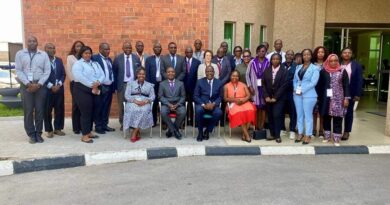Health Minister seeks UN aid for drought-Related health Challenges
Health Minister Sylvia Masebo has called upon the United Nations (UN) to bolster support in mitigating the adverse health effects of drought in Zambia, as the country grapples with the repercussions of prolonged dry spells affecting seven provinces.
During a meeting with UN Assistant Secretary General Reena Ghelani and UNICEF Regional Director Etleva Kadilli in Lusaka, Minister Masebo highlighted the urgent need for assistance in combating various health challenges exacerbated by the drought.
Masebo emphasized the importance of a multi-sectoral mitigation plan developed by Zambia to address the social, economic, and health impacts of the drought. She underscored the necessity for technical, financial, and material support from the UN to complement local efforts in implementing the plan effectively.
Anticipated health-related challenges mentioned by Masebo include an increased risk of diarrheal diseases due to water shortages, animal diseases, and respiratory ailments resulting from dry conditions.
Additionally, she expressed concerns about the potential rise in social behaviors such as drug and alcohol abuse due to reduced food availability, which could lead to related health issues.
Furthermore, Masebo highlighted the impact of malnutrition resulting from micronutrient deficiency and power disruptions on essential hospital equipment and services.
In response, UN Assistant Secretary General Reena Ghelani commended President Hakainde Hichilema and Minister Masebo for their exemplary leadership in addressing health crises such as cholera and for providing a roadmap to mitigate climate change’s adverse effects.
Ghelani assured the UN’s commitment to providing technical, financial, and material support to alleviate the negative health impacts of drought in Zambia.
Similarly, UNICEF Regional Director Etleva Kadilli praised Minister Masebo’s efforts in controlling cholera outbreaks and expressed concern over the vulnerability of children to health issues such as cholera, COVID-19, and drought-related malnutrition. UNICEF pledged to increase support to mitigate malnutrition in children resulting from the current drought.
The collaborative efforts between Zambia and the UN underscore the urgency of addressing health challenges exacerbated by climate-related disasters and reaffirm the commitment to safeguarding the well-being of vulnerable populations, particularly children, in the face of environmental crises.



